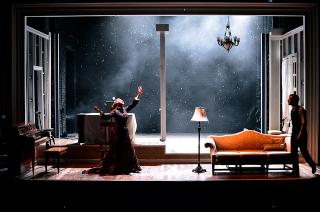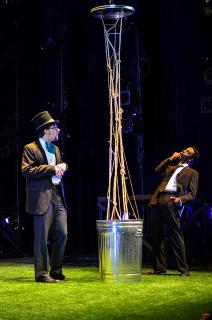Dramat Roadmap

The Yale Dramatic Association is the second oldest college theater association in the country and the largest undergraduate theater organization at Yale. The Dramat produces six shows a year: two Experimental Shows (or Exes), the FroShow, the Fall Mainstage, the Spring Mainstage, and the annual Commencement Musical. From the day of its first meeting on February 2, 1900, the Yale Dramatic Association has been dedicated to producing high quality drama at Yale.
The Producer of any student show serves as the key point-person for the production and is responsible for initiating and maintaining contact with Undergraduate Production, in this case the UP Technical Advisor (TA) assigned to the Dramat. The producer should begin by thoroughly reviewing the Undergraduate Production Regulations and scheduling the first meeting with the TA. The producer should be in touch with UP as early as possible in the planning process, ideally as soon as their production is awarded a performance slot.
The Producer is the overall head of the production team and is ultimately responsible for the smooth and efficient flow of the project. They are responsible for securing rights to the performance piece as well as securing appropriate and adequate rehearsal space, ensuring that all production positions are filled, establishing a production schedule detailing the requirements of the production and ensuring that the schedule of deadlines is being met, and for establishing and maintaining a budget for each department of production. It is the Producer’s responsibility to work closely with the Dramat Production Officer as well as each member of their production staff and to keep the UP Technical Advisor and the Dramat Board up to date on the production and how it is progressing.
The Producer is also responsible for the safe and proper use of the rehearsal and performance spaces. The Producer must accept responsibility for the security of and access to the theater during the period of habitation of the production. The Producer is responsible for ensuring that the theater is clean and orderly before and after each rehearsal, work period, performance, and strike.
Important Steps for the Producer
This roadmap assumes you have been assigned a production slot, have fully staffed your team, and are ready to begin actual production. You will find that the Dramat has a very developed production support structure to assist you including mentors, a Production Officer, and the UP Technical Advisor. Never hesitate to ask any of them for assistance should you feel the need.
Step 1: Read and become familiar with all relevant regulations and guidelines.
Step 2: UP Production Application.
- Confirm all production dates and obtain, complete, and submit the UP Production Application to the UP Technical Advisor for initial review.
Step 3: Budget.
- Your funding is supplied by the Dramat. The Dramat is not eligible for CPA funding. You will need to carefully track your spending. The Dramat should provide you with a Budget Worksheet set up to help you track spending against multiple funding sources. Contact the Production Officer or previous producer for a copy.
Step 4: Pre-Production
- A Content Advisory form should be created for your production, and shared with your production team. This should be a living document, and is designed to be updated as the production and the show evolve.
-

Schedule design concept meeting(s) for the Director and Designers. This is the time to start exploring the environment you and your team will be creating for your piece. It is not necessary to come to any final decisions, but it will be helpful to have a few strong ideas that you can take to your next meeting with the Technical Advisor. Designers should be advised of basic budget allotments at this time. These allotments may change as the needs of the production take further shape but this will give the designers a ballpark to work within.
- Once you have a fairly firm plan for how the team wishes to proceed, including preliminary design drawings, schedule your next meeting with the TA. This must take place a minimum of two weeks prior to the deadline you have set for final set drawings.
- Plan Review meeting with the TA. The director and designers should be present for this meeting to present their ideas to the TA for review. At this meeting the overall scale and scope of the production will be evaluated, suggestions made, and approval given to move forward, possibly with restrictions.
- The deadline for final set drawings will be a minimum of 6 weeks prior to load-in for mainstage productions, 4 weeks for Ex and Froshow.
- The deadline for final lighting and sound documentation will be a minimum of 3 weeks prior to load-in for mainstage productions, 2 weeks for Ex and Froshow.
- Once final designs have been submitted the Technical Advisor will work with the team as required to evaluate, quantify, and make any needed adjustments prior to giving final approval to move toward build.
- Once final approval is received, the Producer will review the updated Production Application with the Technical Advisor. This should take place prior to the start of build but no later than two weeks prior to load-in.
- Failing to meet these deadlines will automatically reduce the scope of what will be possible and approved.
- Schedule weekly Production Team Meetings. Weekly progress reports are to be submitted to the TA by email every Monday morning during the production process. This allows any issues that may arise to be identified and addressed in a timely way.
- Schedule a load-in meeting with Prod Staff and Technical Advisor. This meeting is to review and set plans for load-in, ensure appropriate crew allotments, and schedule all work calls. Work call plans must include start/end times, appropriate breaks, specific tasks, and overall goals. It is important to remember here that no student may work more than 8 hours plus breaks, before being required to break for a minimum of 12 hrs.
Step 5: Production
- Curfew There is a firm curfew of midnight for all production activity, with the exception of strike, which may continue until 1am, or later with UP staff supervision. Production activity includes meetings. Production teams should be exiting the theater or rehearsal room no later than midnight.
- Load-In Make sure that all production team members, cast, and crew know when to arrive. “Supervised Tech” begins with the arrival of the TA. During supervised tech students are allowed to perform any/all required tasks, but those tasks requiring TA supervision should be prioritized. The TA will oversee the load-in along with the Production Officer as a primary supervisor of the work force.
- Supervised Tech All supervised tech time must be scheduled in advance with the TA. If the TA is unavailable for a desired work call a suitable replacement may be hired at the TA’s discretion.
- Unsupervised Tech Tech time for rehearsals and unsupervised activities can occur as student schedules allow, until midnight.
- Inspections YFCC, along with the TA, will conduct a Life Safety Inspection of the performance space on the Weds prior to opening.
- Performances Ensure that the theater is clean and orderly. Ensure that a House Manager has been scheduled with UP, arrives 1 hour prior to the start time, and does a thorough walk through of the space with the hired CSSO. Verify that the House Manager has the adequate number of ushers. Verify that the performance space is secure, locked, and all lights are turned off prior to leaving the space.
Step 6: Post-Production
- Strike Make sure that all production team members, cast, and crew will be at strike on the final night of the performance. 20 minutes can be given to after-show socializing. After 20 minutes, please turn on the work lights and politely request that the audience members exit the theater so that strike can begin. The Technical Advisor will oversee the strike and will coordinate with the Production Officer as supervisor of the work force. Strike must conclude by 2am. A minimum break of 12 hrs must be provided before any subsequent work call may be scheduled to begin.
Step 7: After-strike
- The Producer will be held responsible for returning all rental items. The producer may delegate these tasks but will be the one held accountable for their completion.
- Financial “Strike” will be accomplished with the Dramat treasurer during the initial strike call.
